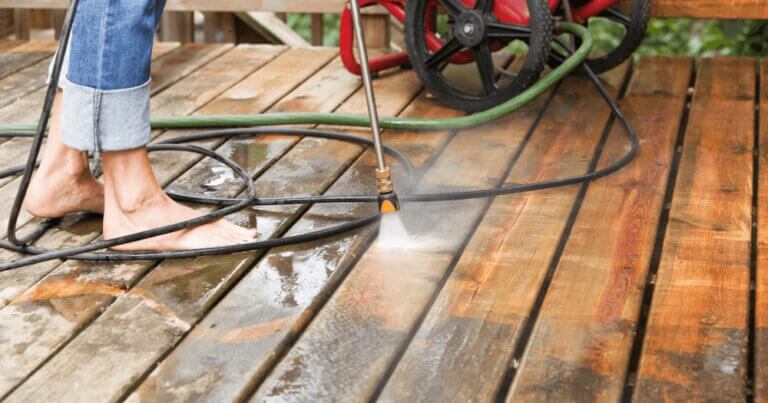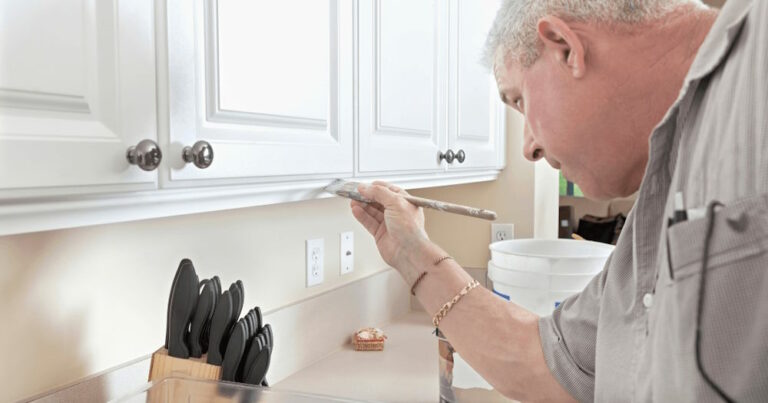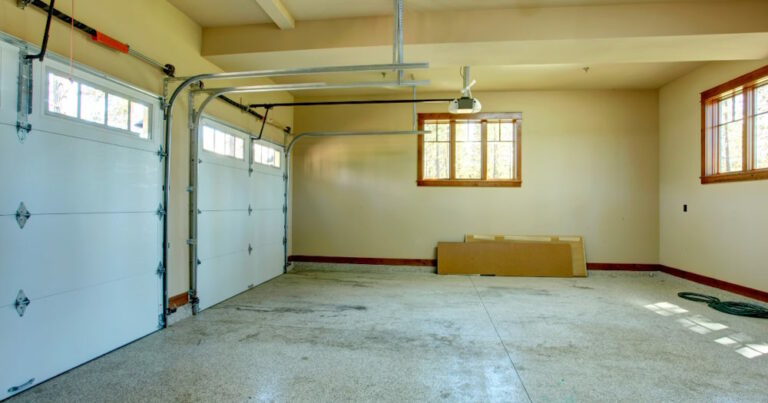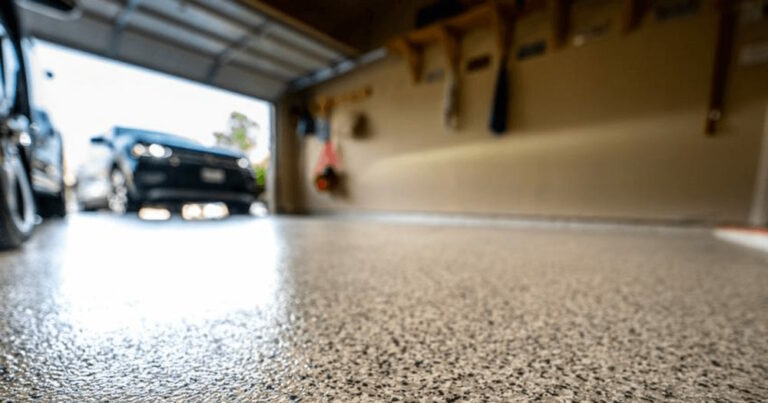If you’re looking to revamp your garage floor, you may be wondering which option is best for your needs. Two popular choices are garage floor tiles and epoxy, each with its own set of pros and cons. In this article, we will compare these two options in detail, analyzing lifespan, cost, and more to help you make an informed decision for your garage makeover.
Key Takeaways:
- Garage floor tiles and epoxy are both popular options for revamping your garage floor.
- You should consider factors such as lifespan, cost, and installation process when deciding between garage floor tiles and epoxy.
- Garage floor tiles offer customization options and durability, but can be more expensive and susceptible to moisture issues.
- Epoxy is a budget-friendly option with a seamless finish, but may require professional installation and can be more difficult to maintain.
- By weighing the pros and cons of each option, you can make an informed decision for your garage flooring makeover.
Introduction to Garage Floor Tiles

If you’re considering renovating your garage flooring, you might want to explore the benefits of using garage tiles. These tiles come in various types and have become increasingly popular due to their durability and customization options.
The Benefits of Using Garage Floor Tiles
Garage floor tiles offer several advantages over a traditional concrete floor. First and foremost, they are durable and can handle heavy loads, making them ideal for use in garages with vehicles. Additionally, they are easy to install and can be customized to suit your style and preferences. Whether you want a classic checkerboard design or a sleek, modern look, garage floor tiles can make your garage stand out.
The Different Types of Garage Floor Tiles
Garage floor tiles come in various materials, including PVC, vinyl, and porcelain. PVC and vinyl tiles are popular due to their affordability and ease of installation, while porcelain tiles offer superior durability and resistance to moisture. You can choose from an array of colors, sizes, and textures to create a unique and personalized look for your garage.
Advantages of Garage Floor Tiles
Garage floor tiles offer several advantages over other floor covering options for your garage. Here are some of the benefits of using garage floor tiles for your garage renovation:
| Advantages | Details |
| Durability | The interlocking design of garage floor tiles makes them highly durable and resistant to heavy loads and foot traffic. They can withstand the weight of vehicles, tools, and other equipment, without cracking or chipping. |
| Customization | Garage floor tiles come in a variety of colors, patterns, and textures, allowing you to customize your garage floor according to your personal style. You can mix and match tiles to create your unique design, and even add borders or logos for a more personalized touch. |
| Easy Installation | Garage floor tiles are easy to install and require minimal preparation. You can install them over existing flooring, without the need for extensive cleaning or leveling. You can also choose tiles with a peel-and-stick option, further simplifying the installation process. |
| No Drying Time | Unlike epoxy, garage tile flooring do not require drying time. Once installed, you can use your garage floor immediately, without worrying about damaging the surface or waiting for the coating to dry. |
| No Chemical Odors | Garage floor tiles are made from materials that do not emit strong chemical odors, making them a better option for individuals with allergies or respiratory issues. |
Overall, garage floor tiles offer a durable, customizable, and easy-to-install option for renovating your garage floor. Their interlocking design provides a sturdy and reliable surface that can withstand the demands of your garage.
Disadvantages of Garage Floor Tiles
While garage floor tiles have several benefits, they also have some downsides to consider before making your decision.
Moisture Susceptibility
Garage floor tiles are not entirely watertight and may allow moisture to seep through the gaps between the tiles. If your garage is prone to moisture issues, this could lead to mold growth, foul odors, and even damage to your tiles. In contrast, epoxy coatings create a seamless surface that is resistant to water and other liquids, making it a better option for areas with high humidity or moisture.
Cost
While garage floor tiles offer durability and customization options, they can be more expensive than other flooring options, including epoxy. The cost of tiles may depend on the materials, size, and design of the tiles you choose, and the installation process can also add to the overall cost.
Installation Process
Installing garage floor tiles can be more labor-intensive than other flooring options, including epoxy. The installation process includes cleaning and preparing the surface, laying out the tiles, and interlocking them. This process can be time-consuming and may require more than one person to complete.
In contrast, epoxy is typically faster and easier to install. The process involves cleaning the surface, applying the epoxy coating, and letting it cure. While epoxy requires a longer cure time, the installation process itself is less involved.
Consider these disadvantages when making your decision between garage floor tiles and epoxy. While tiles offer benefits in customization and durability, they may not be the best option for all garages, particularly those prone to moisture issues. Also, keep in mind that the cost and installation process can impact your decision.
Lifespan Comparison: Tiles vs Epoxy
When it comes to durability and longevity, both garage floor tiles and epoxy have their pros and cons. Let’s take a closer look at each option:
| Garage Floor Tiles | Epoxy | |
| Lifespan | Garage floor tiles can last up to 20 years or more with proper maintenance. Some high-quality tiles come with a lifetime warranty, giving you peace of mind. | Epoxy also has a long lifespan, typically ranging from 5-10 years. However, it can fade and lose its shine over time, requiring reapplication to maintain its appearance. |
| Wear and Tear | Garage floor tiles are resistant to wear and tear and can withstand heavy foot and vehicle traffic. If a tile is damaged, it can be easily replaced, without the need for a full floor makeover. | Epoxy is also durable but can be more susceptible to scratches and chipping. It may require touch-ups or reapplication in high traffic areas. |
| Resale Value | Garage floor tiles can add value to your home and increase its resale value. Their longevity and high-quality appearance can be appealing to potential buyers. | Epoxy floor can also increase your home’s value, but it may not be as appealing to some buyers who prefer a traditional garage floor look. |
Overall, both garage floor tiles and epoxy can provide long-lasting flooring solutions for your garage. The lifespan and wear and tear will depend on the quality of the product and how well it’s maintained.
Cost Analysis: Tiles vs Epoxy
When considering a garage floor makeover, cost is a crucial factor. Garage floor tiles and epoxy have different price points, so understanding the cost differences is essential for making an informed decision.
| Garage Floor Tiles | Epoxy | |
| Material Cost | $2-$6 per square foot | $3-$12 per square foot |
| Installation Cost | $3-$6 per square foot | $3-$12 per square foot |
| Total Cost (for a standard two-car garage) | $1,200-$3,600 | $1,800-$7,200 |
The material cost for garage floor tiles and epoxy is relatively similar, with tiles ranging from $2 to $6 per square foot and epoxy ranging from $3 to $12 per square foot. However, installation costs for epoxy can be higher due to the more labor-intensive process, making the total cost for epoxy higher than that of tiles.
It’s worth noting that the cost can vary depending on the quality and brand of the materials used. However, in general, garage floor tiles are a more budget-friendly option compared to epoxy.
Ultimately, the choice between garage floor tiles and epoxy will depend on your budget and your desired outcome for your garage floor. Consider the costs carefully and weigh them against the other factors, such as durability, maintenance, and customization.
Installation Process: Tiles vs Epoxy

When it comes to revamping your garage floor, the installation process is a crucial consideration. Let’s explore the installation methods for garage floor tiles and epoxy to help you make an informed decision for your garage makeover.
Garage Floor Tiles Installation Process
Garage floor tiles are easy to install, even for novice DIY enthusiasts. The installation process typically involves:
- Preparing the floor surface by cleaning and repairing any cracks.
- Laying the tiles gently on the floor surface, starting from one corner and gradually working towards the other end.
- Interlocking the tiles using the tongue-and-groove system.
- Trimming the tiles using a saw to fit them snugly against the walls, cabinets, or other obstacles.
Overall, installing garage floor tiles can be completed in just a few hours, depending on your garage’s size and the complexity of the job.
Epoxy Installation Process
Installing epoxy garage floors is a more complex process that often requires professional help. The installation process involves:
- Preparing the floor surface by cleaning, repairing cracks, and etching the surface to ensure the epoxy adheres correctly.
- Applying a base coat of epoxy onto the surface using a roller or sprayer.
- Allowing the base coat to dry for at least 24 hours before applying a second coat.
- Adding a topcoat of clear epoxy to provide a glossy finish.
- Allowing the surface to cure for several days before using the garage.
The epoxy installation process can take up to a week, during which time you won’t be able to use your garage. Additionally, since epoxy requires specific temperature and humidity conditions, it’s important to hire experienced professionals to ensure the job is done correctly.
Maintenance and Cleaning: Tiles vs Epoxy
The maintenance and cleaning requirements for your garage floor are important factors to consider when choosing between garage floor tiles and epoxy. Both options have unique characteristics that influence how you care for and clean them.
Maintenance for Garage Floor Tiles
Maintenance for garage floor tiles is generally straightforward. Regular sweeping and occasional mopping with soapy water are usually sufficient to keep the tiles in good condition. If you notice any stains or spills, it’s essential to clean them up promptly to prevent any damage or discoloration.
One of the critical maintenance factors to consider with garage floor tiles is their regularity. Tiles have spaces between each other, making them more susceptible to moisture accumulation. It’s essential to keep these spaces free of debris and ensure that there are no cracks or gaps in between the tiles.
Maintenance for Epoxy
Epoxy flooring is extremely durable and requires minimal maintenance. Regular sweeping and occasional cleaning with a mild detergent are usually sufficient to keep the surface clean. It’s important to avoid using harsh chemicals or abrasive cleaning tools that may damage the surface.
However, one of the main maintenance challenges with epoxy flooring is its susceptibility to scratches and chips. Heavy machinery or sharp tools can cause damage to the surface, which may require professional repair. Additionally, if you notice any cracks or discoloration, it’s essential to address the issue promptly to prevent any further damage.
Cleaning for Garage Floor Tiles
Cleaning garage floor tiles typically involves sweeping or vacuuming to remove any loose debris. For more stubborn stains or spills, mopping with mild soap and water is usually sufficient. Avoid using harsh chemicals or abrasive cleaning tools that may damage the tiles’ surface.
If you notice any moisture accumulation in between the tiles, it’s crucial to dry the affected area promptly to prevent mold or mildew growth. Additionally, make sure that the tiles are properly sealed to prevent any water infiltration that may cause damage to the substrate.
Cleaning for Epoxy
Cleaning epoxy flooring is generally straightforward and involves sweeping or vacuuming to remove any loose debris. For more stubborn stains or spills, you can use a mild detergent with warm water. Avoid using harsh chemicals or abrasive cleaning tools that may damage the surface.
However, it’s essential to avoid using hot water or steam to clean the surface, as this may cause the epoxy to blister or peel. Additionally, make sure that any cleaning solution is thoroughly rinsed from the surface to prevent any residue from accumulating.
Aesthetics and Customization: Tiles vs Epoxy
The appearance of your garage floor can significantly impact the overall aesthetic of your garage. Both garage floor tiles and epoxy provide various customization and design possibilities to suit your preferences and style.
Garage Floor Tiles Aesthetics and Customization
Garage floor tiles come in various colors, textures, and patterns, allowing for limitless design possibilities. They can be combined to create a unique design, spelling out your initials or laying out a checkered pattern. Tiles can mimic the look of marble, granite, or other premium materials, providing an upscale finish to your garage floor.
Interlocking garage floor tiles also provide the flexibility to create temporary or permanent designs, making it easy to switch up the appearance of your garage floor according to your mood or purpose.
Epoxy Aesthetics and Customization
Epoxy also has a range of design options, but the customization possibilities are not as extensive as garage floor tiles. Epoxy can be tinted to various colors, depending on the product and application. Metallic epoxy provides a sleek, modern look, with a distinct, shimmering effect creating a unique look.
Epoxy can also be combined with paint chips or flakes to add texture and depth to the surface. However, the design options with epoxy are limited to patterns or designs that can be created with paint chips or flakes.
| Garage Floor Tiles | Epoxy |
| Limitless design possibilities | Limited to paint chips or flakes |
| Mimics the look of premium materials | Can be tinted to various colors |
| Interlocking tiles provide flexibility in design | Metallic epoxy provides a unique look |
Overall, garage floor tiles provide more customization possibilities and design options than epoxy. However, the design flexibility of epoxy lies in creating custom paint chip or flake patterns, which can create a unique finish to your garage floor.
Environmental Considerations: Tiles vs Epoxy
When it comes to choosing between garage floor tiles and epoxy, one crucial factor to consider is the environmental impact. Both options have their pros and cons, and it’s essential to examine each aspect to make an informed decision.
Garage Floor Tiles
Garage floor tiles are typically made of PVC plastic, which is a recyclable material. However, the production of PVC involves the use of chlorine, which can release harmful chemicals into the environment. Additionally, the durability of garage floor tiles means that they will eventually end up in a landfill, adding to the waste problem.
Epoxy
Epoxy is a durable and long-lasting material that can last up to 15 years. However, it is not an eco-friendly option as it releases volatile organic compounds (VOCs) during installation that can harm the environment. Moreover, when it comes to disposing of epoxy, it involves a hazardous, time-consuming process that requires professional disposal.
Conclusion
After exploring the pros, cons, lifespan, cost, installation process, maintenance, aesthetics, customization, and environmental impact of both options, it’s now time to decide which one is right for your garage makeover.
If you need professional help in choosing between tile garage floors or epoxy floors, our team at Canyon Painting can help! Call us today!





